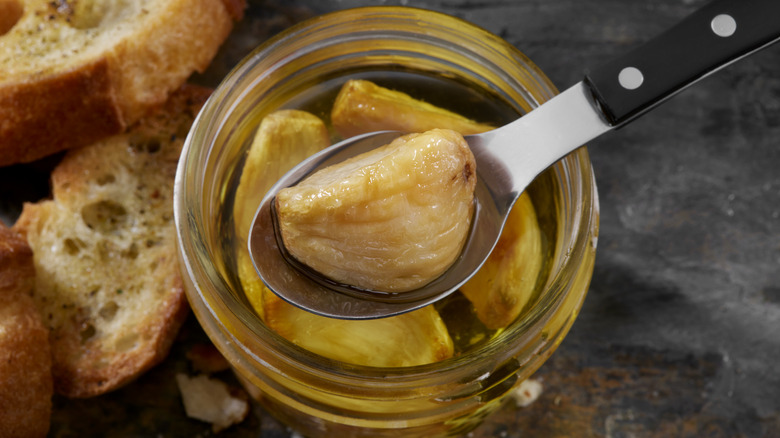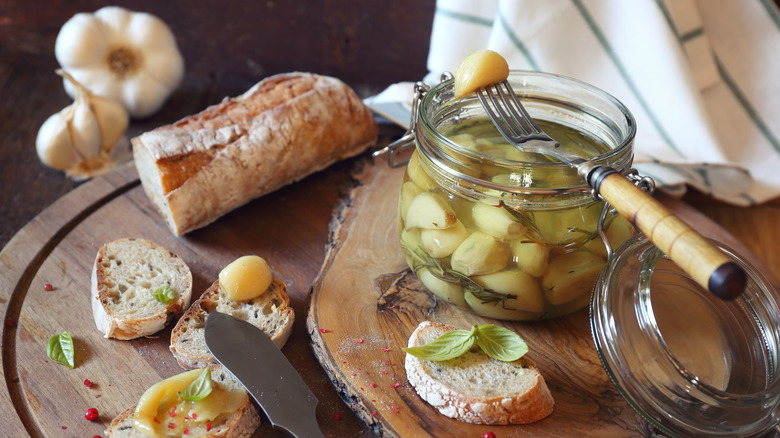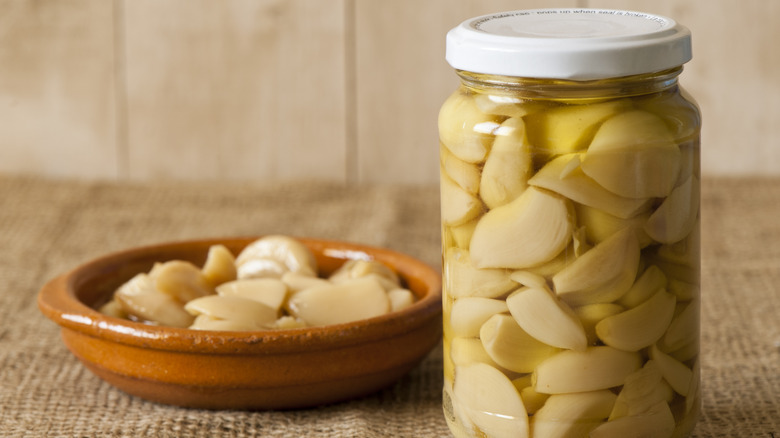Here's How To Safely Store Homemade Garlic Confit
While garlic confit boasts quite the fancy French moniker, preparing this preserved garlic at home to boost flavor in countless dishes is pretty easy. The confit technique began as a way to preserve food, most commonly meats, before the age of electricity and refrigerators — by slowly cooking food in a hot liquid and subsequently storing it in that liquid. However, there are still some natural health risks for toxin growth when preserved in this manner.
Making garlic confit involves not only slow-cooking the garlic but also using home canning techniques to preserve and store it. You'll need to take a few steps to ensure you store your garlic confit safely. Start with the freshest garlic cloves possible, correctly seal your garlic confit in a jar or can, and promptly move it to the refrigerator once it's cooled down. If you follow these steps, your garlic confit will be safe to consume for a couple of weeks.
Making and storing garlic confit at home
When making homemade garlic confit, you could go traditional by cooking and storing your garlic in duck fat, but using quality olive oil does the job just as well. By slowly simmering the garlic cloves in oil, the sharp, pungent notes are mellowed out, leaving behind a soft, flavorful garlic clove ready to top, spread, or cook with as you please. Cover the garlic cloves in oil and bring only to a gentle simmer, no hotter. Then, keep the stove set to low and simmer the cloves for about 45 minutes, then pour them along with their cooking liquid into a jar. Make sure there's enough liquid to cover the cloves entirely.
Don't cover the jar just yet! Let the garlic cloves and oil mixture cool to room temperature before tightly sealing and storing the jar immediately in the fridge. You'll have about two weeks to enjoy this garlic confit, using the infused oil and cloves to sauté vegetables, whip into your mashed potatoes, make vinaigrettes, or anything else you'd add fresh garlic.
Health risks of poorly stored homemade garlic confit
Unfortunately, botulism is a health risk to consider when making and storing garlic confit since it is a low-acid ingredient in a low-oxygen environment. Botulism is an illness that's borne from toxins created by bacteria growth and can be very dangerous. Storing the garlic confit in an environment under 38 degrees Fahrenheit means the toxins form slower, giving you that two-week window to enjoy your garlic confit.
This is why fully sealing your can of garlic confit and storing it in cold temperatures is very important. Store garlic confit at room temperature, and you'll create a perfect storm for those botulism-inducing toxins to grow. So it's best to keep it refrigerated the entire time. You could even freeze your garlic confit if you'd like to extend its life for several months. And if you have the equipment to pressure-can your garlic confit at home, even better. You don't have to let these risks stop you from making garlic confit. As long as you take the proper steps to safely prepare and store your homemade garlic confit, you'll be able to enjoy it worry-free.


